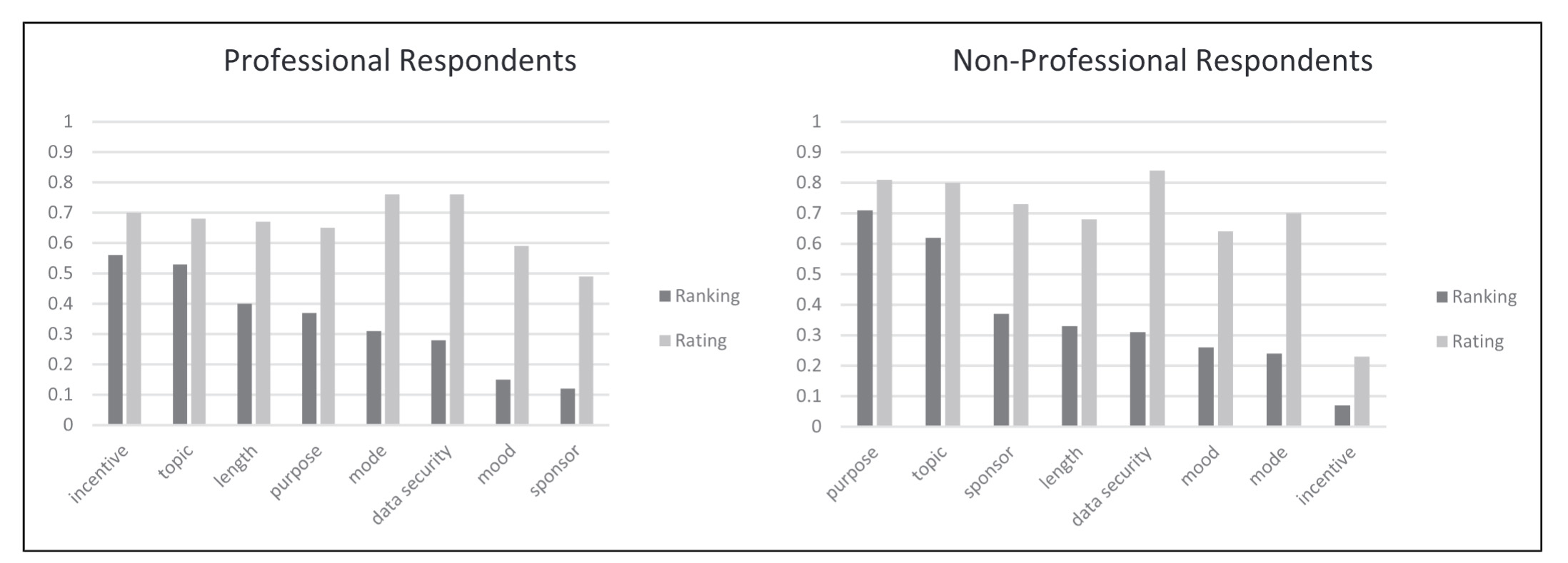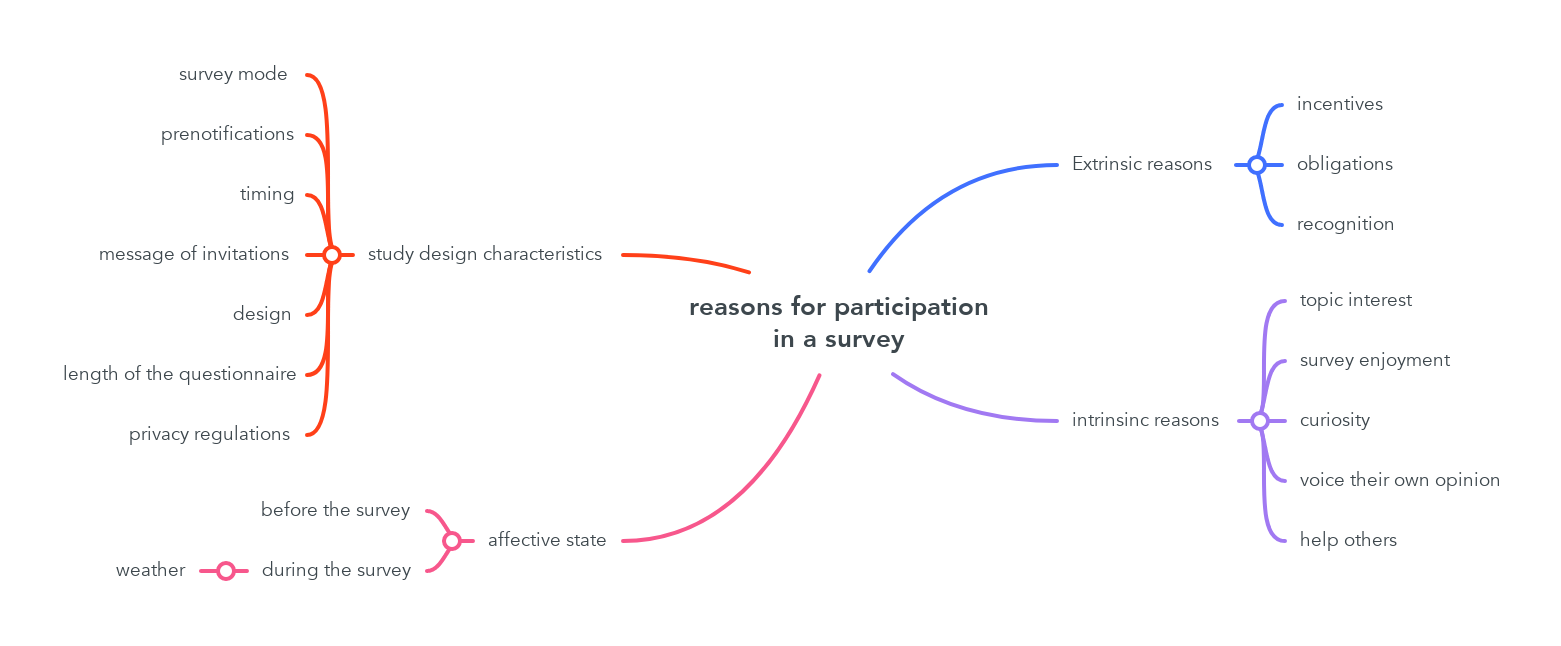Carrying out a survey can be challenging. It is common indeed to be confronted with a shortage of respondents. It is essential to understand the factors that influence participation in a survey (online). In this article, we will discuss 8 factors that influence participation and explain which ones have the most impact. If you want to improve the effectiveness of your CAWI surveys, take advantage of this article.
Contact our survey agency for your projects
Summary
- Introduction
- Participation in an online survey: what are the most important factors
- The remuneration mainly attracts professional respondents
- Non-professionals are primarily interested in the purpose of the survey
- Data security: important in theory but not in practice
- Methodological aspects: beware of biased answers
- Sources
Introduction
There are many reasons for someone to participate in an online survey. We distinguish 4 types of factors:
- intrinsic factors : these are factors specific to the participant, such as their interest in the subject of the survey, curiosity, and desire to help. They have been studied for years in the market research literature.
- extrinsic factors : are mainly, but not exclusively, the financial compensation for participating in the survey. Please read this article to learn more about financial incentives for market research participants. We have talked many times about the length of the questionnaire and the fatigue phenomenon.
- questionnaire design : the design of the questionnaire is, of course, extremely important and influences participation and dropout rates. But there are also other factors, such as the processing of personal data, notifications sent before the survey is launched, etc. …
- participant mood : research has shown that the participant’s mood, especially concerning the weather, influences the survey participation rate.
All of the factors are summarized in the chart below. Of course, not all factors have the same effect. It is necessary to classify these factors to be effective in a survey project. This is the purpose of the rest of this article.
Online survey participation: what factors are most important
Research published in March 2023 compares 8 factors of participation in online surveys. It differentiates between 2 types of survey participants:
- professional respondents, i.e., those who take as many surveys as possible
- non-professional respondents
There is a difference in motivations between the two. But what are they?

Silber, Stadtmüller, and Cernat (2023), the authors of this research, reviewed 8 factors:
- compensation
- topic
- length/number of questions
- purpose
- mode of administration
- security of personal data
- mood
- research sponsor
The research was carried out in Germany, and 2 cohorts of respondents (professional and non-professional) were interviewed. Respondents were asked to:
- choose the 3 most important factors to participate in a survey
- assess the importance of each of the 8 factors on a 7-point Likert scale
Professional respondents most attracted to compensation
The prioritization of the question of the motivations shows that survey compensation is the primary motivation for professional respondents. This makes sense since this type of respondent multiplies responses to maximize earnings.
The financial incentive is followed by:
- the subject of the research in the 2nd position
- the length of the questionnaire in the 3rd position
Non-professionals are most interested in the purpose of the survey
For non-professional respondents, the purpose of the survey is most important. In other words, this type of respondent is primarily motivated by the purpose of the survey. This should be clearly stated when you invite people to complete your survey. Repeat it in the introduction to the questionnaire (see our other advice for structuring your quantitative questionnaire here).
The factors that come in 2nd and 3rd place, respectively, are:
- the subject of the survey
- the sponsor of the survey
Data security: important in theory but not in practice
The surprise of this research concerns the security of personal data. Both types of respondents take data security very seriously. The score given on the Likert scale is very high, whether the respondent is a professional (0.76) or not (0.84).
When respondents are asked to rank the factors in order of importance, everything changes. Data security comes in 6th (professional respondents) and 5th (non-professional respondents).
What does this difference mean? In theory, personal data security is important, but in practice, it is not. A conclusion we already came to in our research on the effects of the GDPR.
Methodological aspects: beware of biased answers
One of this research’s important findings is the bias concerning certain participation factors at different places in the questionnaire and in different forms. This reinforces my belief that the most important questions should be repeated. Here are aspects related to data security (see previous paragraph).
The lesson from this research (beyond the participation aspects) is to use an absolute scale (Likert) and a ranking to be 100% sure of your answers. This will improve the quality of your market research.
Sources
Kämpfer, S., & Mutz, M. (2013). On the sunny side of life: Sunshine effects on life satisfaction. Social Indicators Research, 110, 579-595.
Silber, H., Stadtmüller, S., & Cernat, A. (2023). Comparing participation motives of professional and non-professional respondents. International Journal of Market Research, 14707853231166882.
Posted in Research.




